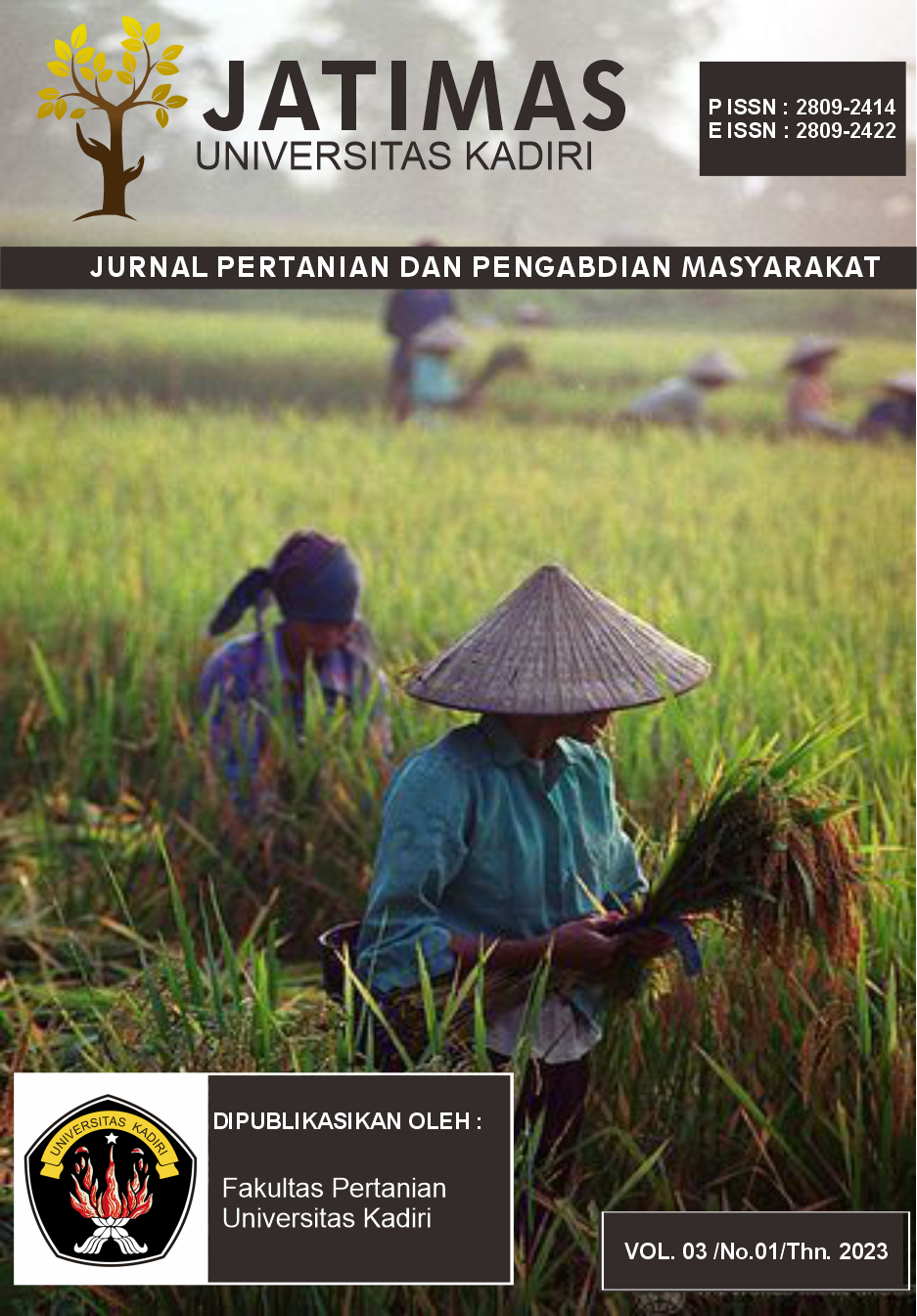Penyuluhan Budidaya Tanaman Obat Tradisional secara Baik dan Benar di Desa Peniron, Kecamatan Pejagon, Kabupaten Kebumen
DOI:
https://doi.org/10.30737/jatimas.v3i1.4555Keywords:
Counseling, Cultivation, Medicine, VillageAbstract
Peniron Village is one of the villages in Pejagoan District, Kebumen Regency, where most of the people work as farmers. The survey results and observations in the field found that ginger, greater and lesser galangal, cardamom, curcuma, turmeric, lemon grass, betel leaf, moringa leaves, gotu kola or centella, papaya leaves, cogon grass, lime, bitter bean, pandan leaf, and tamarind were planted on house yard, garden, and mountain areas. In carrying out the process of cultivating medicinal plants, it was found that there were several obstacles experienced by farmers. In order to raise awareness of proper cultivating techniques of these traditional medicinal plants, the PPK Team for Ormawa Himagrotek UMNU Kebumen conducted counseling with the theme "Cultivation of Traditional Medicinal Plants". The counseling included the benefits of medicinal plants, the content of medicinal plants, how to cultivate medicinal plants properly, then explanation about medicinal plant-based products. The participants, namely the Conservation Group, were very enthusiastic in participating in material counseling activities on the cultivation of traditional medicinal plants. The average participants’ scores of the pre-test to post-test increased by 1.25% from 60 to 75.5.
Desa Peniron merupakan salah satu desa di Kecamatan Pejagoan Kabupaten Kebumen yang masyarakatnya sebagian besar bermata pencaharian sebagai petani. Hasil survey dan observasi di lapangan banyak ditemukan tanaman jahe, kencur, lengkuas, kapulaga, temulawak, kunyit, serai, daun sirih, daun kelor, pegagan, daun pepaya, alang alang, jeruk nipis, petai cina, pandan wangi dan asem jawa yang ditanam di lahan sekitar pekarangan rumah masyarakat, tegalan dan di pegunungan. Dalam melakukan proses budidaya tanaman obat ditemukan adanya beberapa hambatan yang dialami oleh para petani. Dalam rangka menumbuhkan kesadaran budidaya tanaman obat tradional dengan cara yang baik dan benar serta Tim PPK Ormawa Himagrotek UMNU Kebumen melakukan penyuluhan dengan mengangkat tema "Budidaya Tanaman Obat Tradisional secara baik dan benar”. Kegiatan dalam penyuluhan tersebut diisi dengan penyampaian materi tentang macammacam varietas unggul tanaman obat, dari tanaman obat, kandungan dan manfaat dari tanaman obat serta cara budidaya secara baik dan benar, kemudian dipaparkan produk berbasis tanaman obat. Para peserta yakni Kelompok Konservasi sangat antusias dalam mengikuti kegiatan penyuluhan materi tentang budidaya tanaman obat tradisional. Terjadi peningkatan pengetahuan pada peserta penyuluhan setelah diberikan materi sebesar 89% dan nilai rata-rata peserta menjadi 75,5.
References
Firdaus, M. F. (2022). Pengaruh Beberapa Komposisi Media Tanam terhadap Pertumbuhan dan Produksi Beberapa Varietas Jahe (Zingiber officinale Rosc. Universitas Sumatera Utara.
Pemerintahan Desa Peniron. (2020). Statistik Desa Peniron. Pemerintah Kabupaten Kebumen. https://peniron.kecpejagoan.kebumenkab.go.id/index.php/web/statistik_kategori/pekerjaan
Konyep, S. (2020). Deskripsi Beberapa Tanaman Obat Varietas Unggul Badan Litbang Pertanian. In Balai Pengkajian Teknologi Pertanian Papua Barat. Balai Pengkajian Teknologi Pertanian Papua Barat.
Muharram, M., & Kustiani, E. (2021). Pelestarian tanaman obat keluarga (toga) guna meningkatkan kesehatan masyarakat desa gurah di tengah pandemi covid-19. Jurnal Masyarakat Merdeka.
Mustofa, F. I., Baiquni, F., Triyono, A., Wijayanti, E., & Wahyono, S. (2022). Pengetahuan, Sikap Dan Praktik Masyarakat Dalam Penggunaan Jamu Untuk Meningkatkan Daya Tahan Tubuh Selama Pandemi Covid-19 Di Indonesia. Jurnal Tumbuhan Obat Indonesia, 15(1), 57–68. https://doi.org/10.22435/jtoi.v15i1.6034
Novia, A. R. (2011). Respon Petani Terhadap Kegiatan Sekolah Lapangan Pengelolaan Tanaman Terpadu (Slptt) Di Kecamatan Ajibarang Kabupaten Banyumas. Mediagro.
Suparni, & Wulandari, A. (2012). Herbal Nusantara: 1001 Ramuan Tradisional Asli Indonesia (1st ed.). Yogyakarta Rapha Publishing.
Syukur Siregar, R., Ampuh Hadiguna, R., Kamil, I., & Nazir, N. (2020). Permintaan dan Penawaran Tanaman Obat Tradisional di Provinsi Sumatera Utara Demand and Supply Analysis of Traditional Medicinal Plants in Sumatera Utara. Jurnal Tumbuhan Obat Indonesia, 13(1), 50–59.
Widiarti, A., Bachri, A. A., & Husaini, H. (2016). Analisis Pengaruh Faktor Perilaku terhadap Pemanfaatan Kearifan Lokal Sebagai Obat Tradisional oleh Masyarakat di Kota Palangka Raya. Jurnal Berkala Kesehatan. https://doi.org/10.20527/jbk.v2i1.4842
Widiastuti, T. C., Kiromah, N. Z. W., & Ledianasari, L. (2017). Identifikasi Etnobotani Tanaman Obat Yang Dimanfaatkan Oleh Masyarakat Kecamatan Sempor Kabupaten Kebumen. Jurnal Ilmiah Kesehatan Keperawatan, 13(2), 99–106. https://doi.org/10.26753/jikk.v13i2.216
Zulfan, I. (2018). Pelatihan Kewirausahaan Melalui Budidaya Jahe Merah bagi Warga di Kecamatan Jatinangor, Kabupaten Sumedang, Jawa Barat. Jurnal Pengabdian Kepada Masyarakat.
Downloads
Published
Versions
- 26-07-2023 (2)
- 29-05-2023 (1)
Issue
Section
License
Authors who publish in this journal agree to the following terms:
- Authors retain copyright with the work simultaneously licensed under a Creative Commons Attribution License (https://creativecommons.org/licenses/by-nc-nd/4.0/) that allows others to share the work with an acknowledgement of the work's authorship. Permitted third-party reuse is defined by the Creative Commons Attribution-NonCommercial-NoDerivs (CC BY-NC-ND). This permission allows users to copy and distribute the Article, provided this is not done for commercial purposes and further does not permit distribution of the Article if it is changed or edited in any way, and provided the user gives appropriate credit (with a link to the formal publication through the relevant DOI), provides a link to the license, and that the licensor is not represented as endorsing the use made of the work.
- Authors are able to enter into separate, additional contractual arrangements for the non-exclusive distribution of the journal's published version of the work (e.g., post it to an institutional repository or publish it in a book).
- Authors are permitted and encouraged to post their work online (e.g., in institutional repositories or on their website) prior to and during the submission process, as it can lead to productive exchanges, as well as earlier and greater citation of published work.
Deprecated: json_decode(): Passing null to parameter #1 ($json) of type string is deprecated in /home/ojs.unik-kediri.ac.id/public_html/plugins/generic/citations/CitationsPlugin.php on line 68



